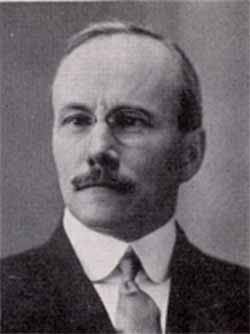http://www.thisday.pcahistory.org/2012/09/september-9-oswald-t-allis-wayne-to-write/September 9: Oswald T. Allis |
Born this day on September 9, 1880,

Oswald Thompson Allis was born in Wallingford, Delaware county, Pennsylvania to Oscar Huntington Allis, M.D. and his wife Julia Waterbury Thompson Allis, on this day, September 9, in 1880. He was raised in the family home at 1604 Spruce Street, in Philadelphia. Decades later, this same location was to serve as the cradle for the newly formed Westminster Theological Seminary.
His education included an A.B. degree from the University of Pennsylvania in 1901; the Bachelor of Divinity degree from Princeton Theological Seminary in 1905; the A.M. degree from Princeton University in 1907; and finally the Ph.D. degree from the University of Berlin in 1913, with a dissertation focused on the study of selected Babylonian cuneiform texts.
Dr. Allis first served as Instructor in Semitic Philology at the Princeton Theological Seminary from 1910-1922 and then as Assistant Professor of Semitic Philology at the same institution, from 1922-1929.
Reorganization of the Princeton Seminary placed modernists in control of the school and so prompted the resignations of Drs. Allis, J. Gresham Machen, Robert Dick Wilson and Cornelius Van Til. Over the summer of 1929, plans were laid for the organization of Westminster Theological Seminary. Classes began in that autumn and Dr. Allis served as Professor of Old Testament History and Exegesis at Westminster from 1929-1930 and then as Professor of Old Testament from 1930-1936. When Dr. Machen and others were forced in 1936 to leave the Presbyterian Church in the U.S.A. denomination over their involvement with the Independent Board for Presbyterian Foreign Missions, Dr. Allis chose to remain in the denomination, but retired from his teaching post. Independently wealthy, he was able to devote the remainder of his life to research and writing.
Dr. Allis was the editor of The Princeton Theological Review from 1918-1929 and, beginning in 1929, maintained a position as Editorial Correspondent for The Evangelical Quarterly up until the time of his death, with many of his articles appearing in that publication.
A 1931 promotional brochure for Westminster Theological Seminary prepared by the Student Committee on Publications had these comments regarding Dr. Allis and his teaching:
“It is the painstaking and thorough accuracy of Dr. Allis in whatever he does, that causes his students to marvel. We watch him unravel the intricacies of Hebrew syntax, and his patience is a constant example and inspiration to us.”
“Dr. Allis’ favorite class room pastime is to answer critics who seek to prove the Old Testament untrue and unreliable. He shows how these would-be Bible destroyers are often false or inaccurate, and frequently so even in the realm of sheer facts. To sit under his teaching is to have one’s faith renewed in the Old Testament as the altogether reliable inspired Word of God.”
No comments:
Post a Comment